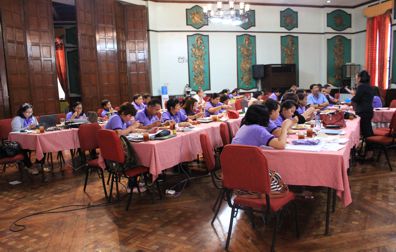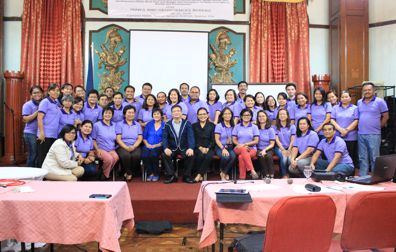In line with the Gender and Development goals embodied in the Magna Carta of Women, the Mines and Geosciences Bureau conducted the Strategic Planning for the 2018 Mines and Geosciences Bureau GAD Work Plan and Budget and Orientation on Basic Concepts on Gender and Development on September 26 to 30, 2016 at the Camelot Hotel in Quezon City, Metro Manila which was attended by GAD representatives of MGB Central Office and Regional Offices.
The first day of the activity commenced with an opening ceremony wherein the participants were acknowledged by the MGB Central Office. In the afternoon, the film entitled Boses was shown by Erasto Production. The film revolves around the themes of repairing broken lives, finding dignity and gaining redemption in meaningful endeavors. As the film strongly depicts heart-wrenching child abuse and violence, it intrinsically stirs the viewers to revisit the deepest core of their beliefs and values. Boses is a film that affirms the strength of the human spirit.
 Ms. Lorenza A. Umali, Gender and Development Specialist, conducted the Orientation on Basic Gender and Development Concepts on the second day of the activity. As stated by the Philippine Commission on Women (PCW), Gender and Development perspective and processes seek to achieve gender equality. The PCW envisions women as active agents of development and not just passive recipients of development assistance.
Ms. Lorenza A. Umali, Gender and Development Specialist, conducted the Orientation on Basic Gender and Development Concepts on the second day of the activity. As stated by the Philippine Commission on Women (PCW), Gender and Development perspective and processes seek to achieve gender equality. The PCW envisions women as active agents of development and not just passive recipients of development assistance.
To strengthen the participants’ knowledge of the legal foundations of Gender and Development, Ms. Umali gave the Orientation on Major Gender and Development Policies. She presented Joint Circular 2012-01, otherwise known as the Guidelines for the Preparation of Annual Gender and Development (GAD) Plan and Budget and Accomplishment Report to Implement the Magna Carta of Women. Policy Guidelines such as the Philippine Plan for Gender-Responsive Development; The Medium Term Expenditure Framework and Organizational Performance Indicator Framework; Executive Order No. 43 (Pursuing our Social Contract with the Filipino People through the Reorganization of the Cabinet Clusters); Republic Act No. 9710 or the Magna Carta of Women; General Appropriations Act (GAA); UN Convention on the Elimination of All Forms of Discrimination Against Women; MDGs and BPIA were reviewed in the discussions. Ms. Umali laid emphasis on the Magna Carta of Women stipulations that “all agencies, offices, bureaus, SUCs, GOCCs, LGUs and other government instrumentalities shall formulate their annual GAD Plans, Programs and Budgets within the context of their mandates.” As for the general guidelines, the following topics were discussed: 1. Annual conduct of GAD planning and budgeting; 2. Inclusion of GAD Plan and Budget in the agency budget proposal; 3. GAD budget as part of agencies’ approved budget; 4. Use of existing tools such as the Harmonized Gender and Development Guidelines (HGDG) for gender analysis; and 5. Agency GAD Focal Point System (GFPS) as lead in gender mainstreaming.
Ms. Umali expounded on the Steps in Formulating the GAD Plan; Allocation of the GAD Budget; GAD Budget Attribution; Submission, Review and Endorsement of Agency GAD Plans and Budgets; Implementation and Monitoring of the GPB; Preparation of GAD Accomplishment Report and Audit of GAD funds.
On the third day of the activity, Ms. Umali conducted a discussion on GAD Guidelines – Gender Analysis Tool for Programs, Projects and Activities. The in-depth presentation of the Process of Attribution to the GAD Budget was given by Ms. Umali.
The GAD Specialist presented the Overview and Policies on the Philippines’ Harmonized Gender and Development Guidelines. She stated the background of the said guidelines which is anchored on the National Economic and Development Authority-National Commission on the Role of Filipino Women (NEDA-NCRFW) Guidelines for Developing and Implementing Gender-Responsive Programs and Projects and Republic Act No. 7192 (Women in Development and Nation Building Act). She discussed the integration of GAD perspective in development planning processes and various stages of the project cycle and addressing the issues of inadequate sex-disaggregated data and the statistics for development planning and programming. Ms. Umali stressed that the promotion of the twin goals of gender equality and women’s empowerment is the essence of the Harmonized Gender and Development Guidelines.
Ms. Umali also presented and discussed the Harmonized Gender and Development Guidelines (HGG) Checklist for Program/Project Identification, Planning and Design; Harmonized Gender and Development Guidelines (HGG) Checklist for Program/Project Management and Implementation and Harmonized Gender and Development Guidelines (HGG) Checklist for Program/Project Monitoring and Evaluation at length.
A workshop on the Application of Checklists for Programs, Projects and Activities followed after the comprehensive discussions. Ms. Umali mentored and assisted the participants during the workshop. She reminded them that the HGG rating system also helps in identifying programs or projects from which “useful practices” may be highlighted and shared, as it demonstrates how gender equality and women’s empowerment ideals can be fulfilled. The participants were guided well in accomplishing the checklists and interpreting the total GAD score that will determine the attribution of a project to the GAD Budget. After the workshop, a plenary ensued wherein the participants presented their outputs which were thoroughly reviewed by the GAD Specialist.
On the fourth day, the heart of the matter of the activity was discussed. The Inputs to MGB GAD Plan and Budget was presented by Ms. Umali. She expounded on the elements of the GAD Plan and Budget Matrix/Template. In the same way, the Annual Gender and Development (GAD) Accomplishment Report Template was presented and discussed at length by Ms. Umali. The 2017 MGB GAD Plan and Budget and 2016 GAD Accomplishment Reports of some Regional Offices were presented by their representatives. On the same note, the participants drafted their inputs to the 2018 GAD Plan and Budget which were reviewed by Ms. Umali. In order to assist and prepare the participants in their undertakings, she mentored the participants and gave a straightforward discussion on identifying gender issues and integrating gender perspectives in MGB programs, projects and activities.
On the last day of the activity, some of the participants were asked to present their outputs which were constructively critiqued by the GAD Specialist. It was followed by a plenary discussion and synthesis in which some participants shared their insights. Some participants also imparted their realizations and learning experiences which the MGB Central Office Working Committee appreciated and took note of.

